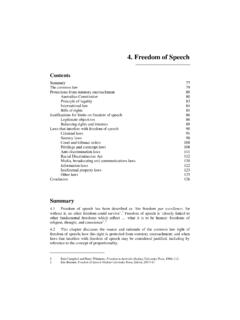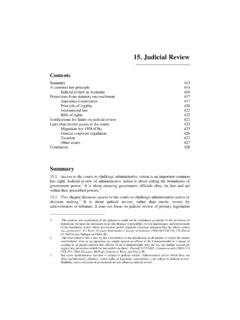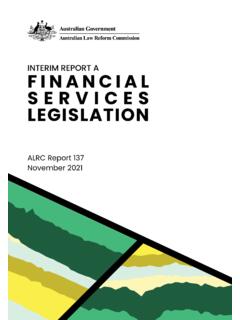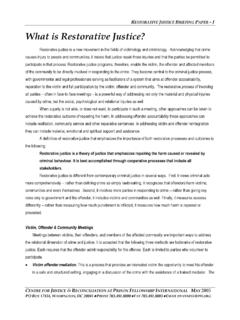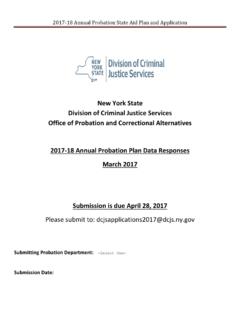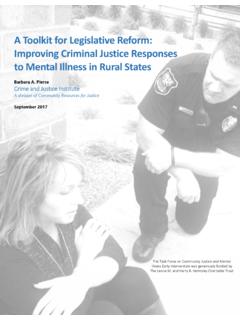Transcription of 13. Criminal Justice Responses - ALRC
1 13. Criminal Justice Responses Contents Summary 363 Offences 364 Specific offence of elder abuse 364 Offences for misusing powers of attorney 365 Neglect offences 366 Alternatives to specific offences 369 Improving police Responses to elder abuse 370 Assisting vulnerable witnesses 373 Summary Responsibility for Criminal laws and frameworks relevant to elder abuse falls principally to Australian states and territories. Criminal practice and procedure, court practice and procedure, policing, prosecution and victim support, and sentencing legislation and practice are also predominantly addressed at the state and territory level. Key issues identified by stakeholders in respect of the Criminal law and related processes and frameworks were: the need to create specific offences for elder abuse , elder neglect and misuse of powers of attorney ; additional support for vulnerable witnesses ; and improved police Responses .
2 The ALRC considers that existing Criminal laws generally adequately cover conduct which constitutes elder abuse, and does not recommend the enactment of specific offences. In this chapter, the ALRC considers other avenues to improve the operation of the Criminal law, including police Responses and providing appropriate assistance for witnesses who require additional support to participate in the Criminal Justice system. In Chapter 14, the ALRC makes recommendations relating to adult safeguarding laws aimed at safeguarding and supporting adults at risk .1 These laws would provide adult safeguarding agencies a role that is complementary to police, and are aimed at improving Responses to elder abuse. 1 See rec 14 2 for a definition of an at-risk adult . 364 Elder Abuse A National Legal response Offences Specific offence of elder abuse Some overseas jurisdictions, including a number of states in the US, have enacted specific Criminal offences for the abuse of older persons.
3 These offences broadly encompass behaviour that causes or permits an older person to suffer, be injured, or be placed in a situation in which their health is Generally speaking, Australian state and territory laws have not enacted such offences. However a range of types of conduct, which might be described as elder abuse , are covered in all jurisdictions under offence provisions relating to personal violence and property offences. These include assault, sexual offences, kidnap and detain offences, and fraud and theft offences. Some jurisdictions have offences for neglect, although these are rarely utilised in respect of older people. There are also comprehensive family violence frameworks in all jurisdictions that provide for quasi- Criminal protective Responses , which may be relevant for older people experiencing elder abuse in domestic settings.
4 Some stakeholders supported new Criminal offences that would proscribe certain types of conduct, including, for example, assault when perpetrated against an older person where there is a relationship of It was suggested that specific elder abuse offences would: support effective Criminal Justice pathways for victims of elder abuse ;4 act as a deterrent;5 recognise the increased vulnerability of older persons;6 and serve an educative function and increase awareness of the The ALRC considers that the existing Criminal laws largely provide appropriate offences to respond to the types of conduct that might be understood to constitute elder abuse . Where the type of conduct proscribed is already captured, new offences are unnecessary and risk duplicating existing offences. Some stakeholders also submitted that an elder abuse offence risked being The ACT Human Rights Commission submitted, for example, that offences limited to abuse against elders have the potential to be paternalistic and discriminatory.
5 9 2 See, eg, Cal [Pen] Code ; Mo Rev Stat (2013); Fla Stat 825 (2012). 3 See, eg, Office of the Public Guardian (Qld), Submission 384; Eastern Community Legal Centre, Submission 357; R Lewis, Submission 349; Protecting Seniors Wealth, Submission 312; Office of the Public Advocate (Vic), Submission 246; Seniors Rights Service, Submission 169; National Seniors Australia, Submission 154; Legal Services Commission SA, Submission 128; Office of the Public Advocate (Vic), Submission 95; Alzheimer s Australia, Submission 80. 4 See, eg, Office of the Public Guardian (Qld), Submission 384; Office of the Public Advocate (Vic), Submission 246. 5 See, eg, Protecting Seniors Wealth, Submission 312; Seniors Rights Service, Submission 169; ADA Australia, Submission 150; Gadens Lawyers (Melbourne), Submission 82.
6 6 See, eg, Australian Research Network on Law and Ageing, Submission 262; R Lewis, Submission 100. 7 See, eg, Protecting Seniors Wealth, Submission 312; WA Police, Submission 190; People with Disability Australia, Submission 167. 8 ACT Human Rights Commission, Submission 337; Legal Aid ACT, Submission 58. See also the Law Society of NSW s views expressed in: Law Council of Australia, Submission 61. 9 ACT Human Rights Commission, Submission 337. 13. Criminal Justice Responses 365 Additionally, the need for specificity in framing Criminal offences presents a difficulty in seeking to create a new elder abuse offence. The Office of the Public Advocate (Qld) commented, for example, that [t] here is little value in developing a specific Criminal offence of elder abuse. With the wide range of behaviours that might constitute elder abuse, the development of a definition that would effectively encompass all of those behaviours and the thresholds for criminality would be extremely difficult.
7 In any event, there are already adequately tried and tested legal offences available to effectively prosecute a wide range of Criminal behaviours that might constitute elder Stakeholders suggested that, even if new offences were not introduced, the law should be harmonised to ensure that a court can take into account the age of the victim in Courts in each of the states and territories are guided by a mix of statutory and common law principles. Many states and territories specifically recognise the circumstances of the victim when sentencing In jurisdictions which do not specifically provide statutory guidance, the common law position applies. Under the common law, the elderly nature of a victim is an aggravating factor for the purposes of Offences for misusing powers of attorney In all Australian jurisdictions, there are offences that broadly relate to fraud, deceptive conduct, stealing and other property related offences.
8 In certain circumstances, some of these may be applicable to cases of financial abuse of older people, including in respect of abuse of powers of attorney. In Victoria and Queensland there are a range of offences specifically relating to powers of The ALRC is unaware of any prosecutions under these provisions. The Law Institute of Victoria15 and the Office of the Public Advocate (Vic),16 welcomed new Criminal offences relating to abuse of powers of attorney in that jurisdiction, and supported the creation of similar provisions in other states and The NSW Legislative Council subsequently recommended that NSW legislation be amended to be consistent with Victoria s Powers of Attorney Act The ALRC is not persuaded that there is a need for a specific offence for misusing powers of attorney. Where they exist, offences for misusing powers of 10 Office of the Public Advocate (Qld), Submission 149.
9 11 See, eg, ACT Human Rights Commission, Submission 337; National Seniors Australia, Submission 154. 12 Crimes (Sentencing) Act 2005 (ACT) s 33(1)(d); Crimes (Sentencing Procedure) Act 1999 (NSW) s 21A(2)(l); Penalties and Sentences Act 1992 (Qld) s 9(3)(c); Criminal Law Consolidation Act 1935 (SA) s 5AA(1)(f)(j); Sentencing Act 1991 (Vic) s 5(2)(da); Sentencing Act 1995 (WA) s 6(b). 13 Richard Edney and Mirko Bagaric, Australian Sentencing: Principles and Practice (Cambridge University Press, 2007) 129. 14 Powers of Attorney Act 1998 (Qld) ss 26, 61; Powers of Attorney Act 2014 (Vic) ss 135 136. 15 Law Institute of Victoria referred to in Law Council of Australia, Submission 61. 16 Office of the Public Advocate (Vic), Submission 95. 17 These provisions reflect the recommendations made in: Law Reform Committee, Parliament of Victoria, Inquiry into Powers of Attorney: Final Report (August 2010) rec 61.
10 18 Legislative Council General Purpose Standing Committee No 2, Parliament of New South Wales, Elder Abuse in New South Wales (2016) rec 7, [ ]. (NSW Elder Abuse Inquiry) 366 Elder Abuse A National Legal response attorney have been established based on the argument that existing, broader offences are not being utilised, as opposed to the fact that they do not encompass the relevant conduct. Creating new offences risks duplicating existing offences,19 and risks increasing complexity,20 without any assurance of increased prosecution of the conduct. Criminal law requires a high evidentiary threshold to be met to sustain a prosecution. Financial offences, in particular, are often difficult and complex to prosecute, and will continue to be so irrespective of the existence of new specific provisions relating to powers of attorney.

